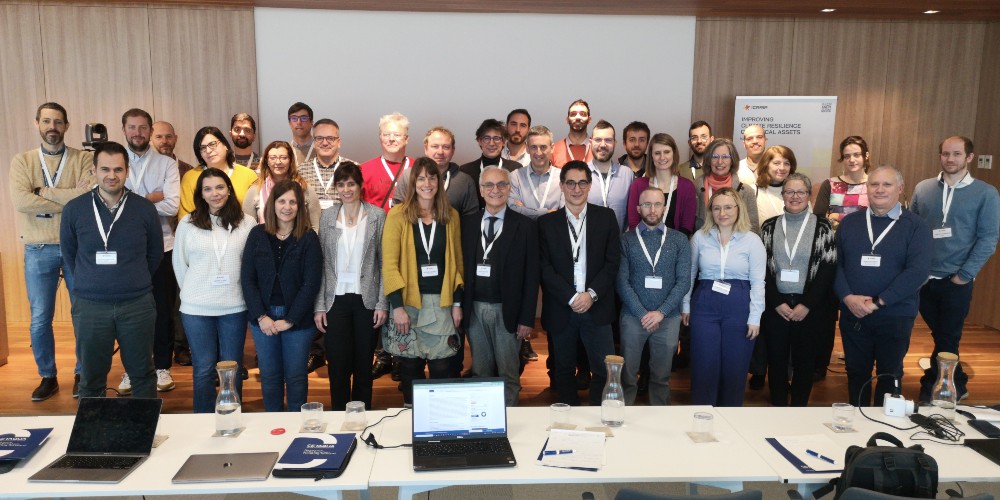Project to improve critical infrastructure resilience to extreme weather events launched

Experts from the University of Exeter will play a pivotal role in a new international consortium, tasked with improving the resilience of critical infrastructures to extreme weather events.
Experts from Exeter’s Centre for Water Systems are part of a pan-European project, called ICARIA, which will look at the impact of natural disasters on strategic infrastructures across the water, energy and transport sectors.
The initiative also seeks to understand how these events could affect the life-cycle costs of these infrastructures in the coming decades, and ensure investments are made to cope with these changes.
The project, which held its inaugural meeting in Barcelona recently, will last for three years. The University of Exeter’s participation in ICARIA will be supported by funding of €194,000 from the UKRI Horizon Europe guarantee scheme.
The team at the Centre for Water Systems (CWS), including Prof Albert Chen, Prof Slobodan Djordjevic, Prof Dragan Savic, Dr Lydia Vamvakeridou-Lyroudia, and Dr Barry Evans will participate in the ICARIA consortium to advance the research on analysing the interactions between multiple hazards, their knock-on effects on critical infrastructure and services, and the associated impact to communities.
Prof Albert Chen, the Exeter lead in ICARIA, says “CWS’s strong expertise on climate disaster modelling, impact assessment, risk management and resilience subjects has formed a solid foundation for ICARIA research, which will further enhance the understanding of the dynamics of combined and compound hazards, and strengthening the capacity in disaster mitigation.”
In the recent years, the number of disasters caused by climate hazards has increased considerably. According to recent studies by the United Nations, between 2000-2019, more than 7,000 disasters caused by the climate crisis were recorded, affecting more than 4 billion people and causing an economic loss of nearly $3 trillion worldwide.
This increase in damages is mainly due to a significant increase in extreme weather events, such as heat waves, droughts or floods. Looking ahead, if the increase in global temperature remains on the current trajectory and net-zero emissions targets are not met by 2050, the frequency of these catastrophes will continue to increase and around 10% of the world’s economic value will be lost.
To carry out the research, ICARIA will work on three case studies across Europe. Two of them, the Barcelona Metropolitan Area in Spain and the South Aegean Archipelago in Greece, are located in coastal areas of the Mediterranean, considered a hotspot for receiving more severe extreme weather impacts than the global average and for concentrating more than half of the continent’s population. Salzburg, the third region, is located in Austria, an area heavily affected by the climate crisis, with melting glaciers and heat waves directly impacting assets related to energy production and other strategic sectors.
The project will also assess the replicability of the proposed solutions, first among the different case studies and then in five other regions already selected: the Vega Baja region in the Valencian Community in Spain; the South Aegean region and Crete in Greece; the Campania region and the Metropolitan Area of Naples in Italy and the region of Upper Austria. At the end of the project, the territories analyzed will have regional-scale adaptation scenarios with climate and socioeconomic projections to understand the short and long-term impact of the measures they take.
Specifically, ICARIA will propose a comprehensive framework for climate resilience and assessment of economic and social impacts. This includes the development and validation of state-of-the-art models capable of simulating risks arising from extreme weather events, as well as the analysis of related climate hazards. The impact assessment will focus on critical and vulnerable assets. On the other hand, cascading effects will focus on strategic services and public and private infrastructures related to the water, transport, energy, housing and environment sectors.
Prof Slobodan Djordjevic, a co-director of the CWS, added: “The ICARIA consortium is built on CWS’s long-term collaboration with EU partners via various projects on climate adaptation and resilience research, including FP7 CORFU (of which CWS was the coordinator), PEARL, H2020 EU-CIRCLE and RESCCUE.” ICARIA follows in the footsteps of previous initiatives such as RESCCUE, a European research project led by Aquatec and completed in 2020. Unlike its predecessor, ICARIA focuses more specifically on modelling and assessing climate impacts on critical infrastructure and their cascading effects on a regional scale, including simultaneous climate hazards such as the occurrence of rainfall and coastal flooding events at the same time or droughts and heat waves coupled with wildfires.



